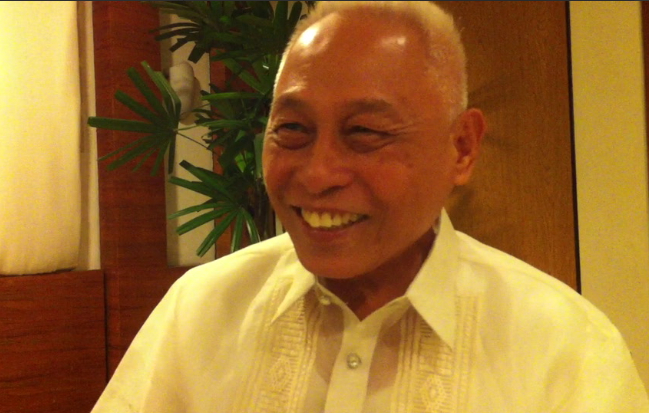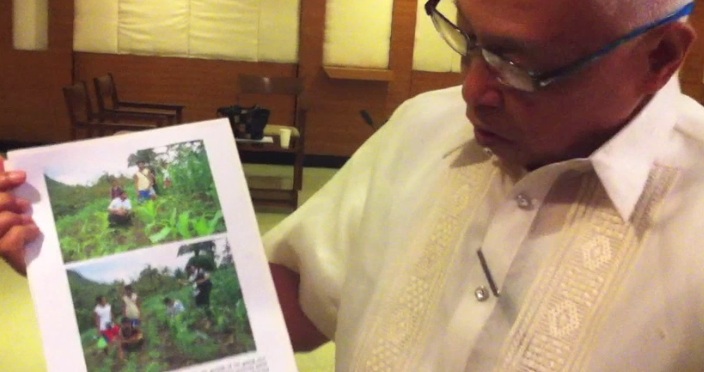SUMMARY
This is AI generated summarization, which may have errors. For context, always refer to the full article.

MANILA, Philippines — Growing up in Cebu, Romulo Davide would walk barefoot in the morning to forage food for his family’s carabao. Then he would rush to the nearest river to catch shrimps which he would boil for breakfast at home where his family of 9 awaits.
Romulo could hardly believe that what he considered a playground as a child would be his laboratory as a top scientist in the country.
The farm has been Romulo’s life. He once left the country to cultivate his mind but came back to cultivate the soil.
He is now reaping the fruits of his labor. On Friday, August 31, the 78-year-old Romulo will be officially conferred Asia’s premier prize in recognition of his “steadfast passion in placing the power and discipline of science in the hands of Filipino farmers, who have consequently multiplied their yields, created productive farming communities, and rediscovered the dignity of their labor.”
Cultivating the mind
Romulo always remembers his roots in Cebu, bearing in mind what his father taught him: “There are no barren soils, only barren minds.”
After graduating from the University of the Philippines Los Baňos, the young scholar pursued higher studies in the United States. For 21 days, he sailed from Manila to San Francisco with a US$500-grant from a generous professor who saw his intelligence and believed in his passion.
Abroad, he earned his master’s and doctorate degrees, meeting a Nobel laureate and other experts in a field of science that has not set foot on Philippine soil — nematology, the study of roundworms or pests that weaken crops.
Despite lucrative opportunities in the US, Romulo went back to the country to introduce the science that he believed will help the farmers in his country.
“Sir, I came to learn so my people will learn from me,” Romulo told his professor at the North Carolina State University who offered him a teaching job in the university.
“Expose yourself to greatness and passion for excellence,” Romulo shared an insight about his pursuit of knowledge that paved the way for his groundbreaking work that produced more than 100 scientific papers.

Father of nematology
Davide is considered the “Father of Plant Nematology” for his pioneering work on nematode pests that attack crops like rice, vegetables, and fruits. His extensive research enabled him to discover the fungi (P. lilacinus and P. oxalicum), which was crucial in the production of the first-ever Philippine biological control product that fought nematode infestations in farms.
More importantly, the product became an alternative to the highly toxic and expensive chemical nematicides which poor farmers could not afford. Nematicides are chemical pesticides used to control parasitic pests.
“‘Pag scientist ang mind mo, there’s an inquiring mind — how things work and how they can be made better,” Romulo said. (If you have the mind of a scientist, there’s an inquiring mind — how things work and how they can be made better.)
“That’s the beginning of the field of science called Nematalogy. No Filipino was specializing in Nematology,” Romulo recalled.
Romulo, who was named an “Outstanding Agricultural Scientist” by the Department of Agriculture in 1994, is currently a professor emeritus at the College of Agriculture in the University of the Philippines Los Baňos.
Cultivating the soil
Romulo invested the P500,000 cash prize he won as an outstanding agricultural scientist in an initiative called Farmer-Scientists Research, Development and Extension Training Program (FSTP).
The program was designed to enhance the scientific skills of farmers, particularly those from upland communities, to grow crops and raise animals utilizing appropriate farming techniques.
Romulo believes in the importance and need for transferring technology to, or developing the same with, farmers.
Citing an example, Romulo said that the program “nurtured the curiosity of two farmer-scientists that led to their discovery of new farming technologies such as the use of sea water as fertilizer to increase yield of peanut plants and the hanging bottled water with strings as irrigation technique to increase vegetable harvests during the hot and dry summer weather.”
“It enabled farmers to discover by experimentation high-yielding varieties of corn, vegetables, sweet potato and other crops that increased their production and income by more than 100%,” Romulo said.
Heroes of our land
The FSTP began in Argao, Cebu in 1994 when it was a 5th class town. According to Romulo, the program helped in the development of Argao which is now a 1st class town. Beginning 2008, the Department of Agriculture scaled up FSTP into a national program, producing farmer-scientists among Mangyans in Oriental Mindoro and the B’laan tribe in Sarangani.
“Farmers are the heroes of our lands. Let us therefore recognize them with honor and dignity and support them to achieve their long-desired abundant productivity and live in peace and prosperity,” Romulo said.
Romulo and 5 other awardees from other countries will join the ranks of 290 other recipients of Asia’s highest honor to date, when they are conferred the award in presentation ceremonies to be held on Aug 31 at the Philippine International Convention Center, to which the public is cordially invited.
The Ramon Magsaysay Award was created in 1957 in honor of the late President Magsaysay, who in the same year died in a plane crash. Known as the “Man of the masses,” Magsaysay was well-loved for his simplicity, humility, and passion for justice, particularly for the poor. – Rappler.com
Add a comment
How does this make you feel?
There are no comments yet. Add your comment to start the conversation.